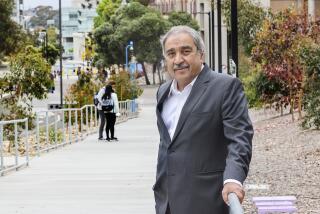Former community college construction chief to get $211,000 salary for a year, plus other benefits
Larry Eisenberg, removed recently as head of the Los Angeles Community College District’s troubled campus construction program, will collect his $211,000 salary for a year, along with a transportation allowance and other benefits, district records show.
The college system’s seven-member board of trustees voted unanimously in a closed session last month to exercise a buyout option in Eisenberg’s contract rather than seek to dismiss him for cause, a potentially long and costly process.
In addition to his salary, the district will continue to pay Eisenberg a $1,530-a-month allowance originally intended for work-related travel, and it will make a $23,298 contribution to the state retirement system on his behalf, district spokesman Coby King said.
Eisenberg also will continue to receive health benefits for a year. The cost will be between $7,694 and $28,603, depending on his choice of medical plans, King said.
Nancy Pearlman, a district trustee, said she believed the arrangement would cost less than seeking to remove Eisenberg for cause without the severance package.
“Do you know how much that would’ve cost?” Pearlman said. “There are a lot of legalities that are quite costly.”
Without board action, Eisenberg’s contract would have run through June 30, 2012.
Eisenberg, 59, was hired in 2003 to lead a $5.7-billion program to rebuild the district’s nine aging campuses. He has been replaced on an interim basis by his deputy, Thomas Hall.
District Chancellor Daniel LaVista said in an interview that he had no immediate plans to start a search for a permanent replacement.
A recent six-part Times series based on thousands of pages of public records reported that poor planning, shoddy workmanship and frivolous spending in the construction program cost taxpayers tens of millions of dollars.
Among other examples, the articles described how officials at West Los Angeles College spent $39 million to design and begin construction of four major buildings, only to discover that they didn’t have the money to complete them. Just as crews were starting work last summer, the projects, including a $92-million athletics center, were abandoned.
The Times also reported, citing district emails, contracts and other public records, that a Mission College vice president oversaw construction at the school while a company she co-owned was being paid more than $500,000 as a subcontractor at the campus. The Los Angeles County district attorney is investigating allegations of conflict of interest; the college official, who resigned, has denied wrongdoing.
When the trustees terminated Eisenberg’s contract on March 9, three days after the Times series concluded, they offered no explanation beyond board President Georgia Mercer’s statement that it was “time to move on in a new direction.”
The district later released a copy of Eisenberg’s contract and related records requested by The Times.
Eisenberg declined to comment.
State Sen. Kevin De Leon (D-Los Angeles) has introduced a bill he said is intended to curb abuses of the kind described in the Times articles.
SB 911 would require local agencies to post annual reports on their websites detailing how much bond money they had collected and spent and describing the status of bond-funded construction projects. The agencies would have to develop conflict-of-interest rules and procedures for enforcing them and would have to disclose ethics complaints and violations on their websites.
“The money does not belong to some college board czars or college presidents,” De Leon said in an interview. The waste in the Los Angeles college construction program could “make it difficult to go back to the taxpayers” for approval of future bond measures, he said.
LaVista said he supported the bill but did not know whether the trustees would endorse it.
More to Read
Sign up for Essential California
The most important California stories and recommendations in your inbox every morning.
You may occasionally receive promotional content from the Los Angeles Times.











